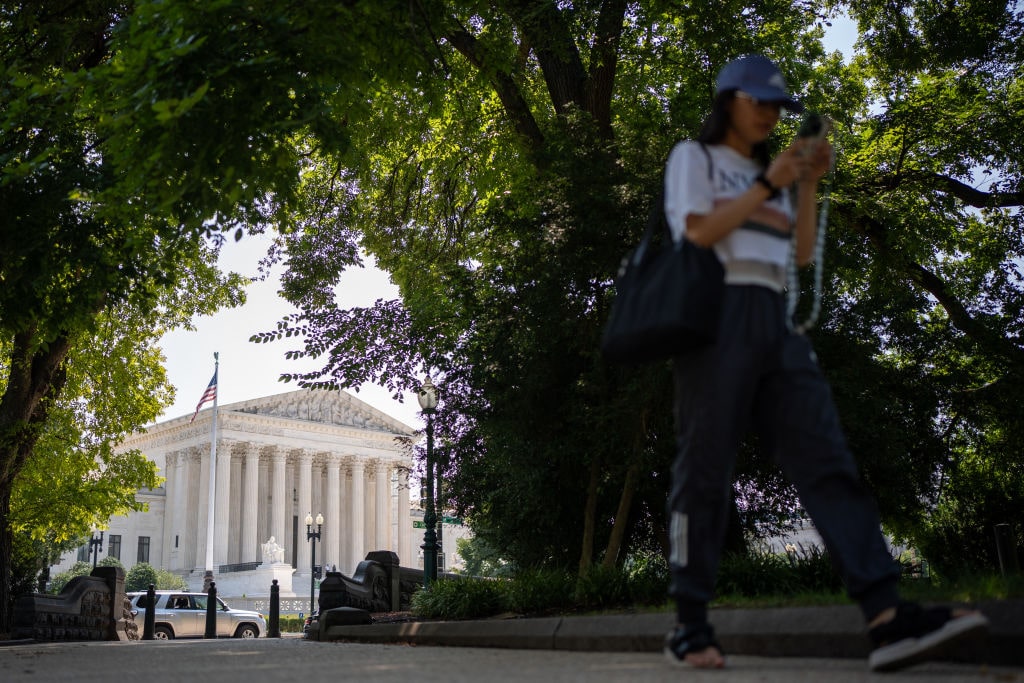With the presidential election right around the corner, the United States Supreme Court resumes hearing oral arguments today, October 7. Their first week back includes a major Second Amendment case on ghost guns, though it’s not the only one on the docket. Other significant cases involve a First Amendment challenge to online restrictions over adult content, a criminal case involving one of the most famous names in politics, and a Tennessee law banning the treatment of transgender minors.
Goodbye, Ghost Guns?
The Supreme Court sets its own calendar and chooses which cases to hear. After a break that started in July, justices are back with a bang in a case over so-called ghost guns. In Garland v. VanderStok, the Court will examine whether the Constitution permits the Biden administration to change federal rules over the meaning of “firearm,” “frame,” and “receiver” and apply novel criminal prohibitions based on the new definitions. Homemade guns made outside the heavily regulated commercial manufacturing markets have been a feature of American life since the birth of the Republic. However, the skill required to successfully make one’s own gun put the prospect out of reach for most folks. But then everything changed.
The 3D printer made homemade guns possible for any American with several hundred dollars and the desire to have one. “Ghost gun” is the scary moniker applied to any homemade firearms because their production is not registered with the federal government, and the anti-gunners are working overtime to ban them. Instead of passing a new law or constitutional amendment to prohibit or otherwise restrict “ghost gun” production, President Biden allowed the ATF to treat a group of gun parts as a fully functional firearm. The Supreme Court accepted the case to rule on this ATF power grab.
Freedom of Speech vs Protecting Minors
Free speech is on the docket, too, with Free Speech Coalition, Inc. v. Paxton amongst the most talked about cases for the new term. The ACLU-led coalition is suing Texas to challenge a 2023 law enacting several restrictions “relating to the publication or distribution of sexual material harmful to minors on an Internet website.” Websites that host spicy content are subject to massive civil fines if a minor accesses adult content without robust age verification procedures mandated by the law. The free-speech advocates say the Fifth Circuit Court of Appeals applied a low standard of review, “rational basis” rather than “strict scrutiny,” which this content-based restriction demands. The standard of review applied is often dispositive of the challenge. Those laws facing strict scrutiny analysis are rarely upheld, while a rational basis analysis allows for all manner of impositions.
 “States can regulate obscenity without any First Amendment restriction, and states can reasonably limit minors’ access to sexual content that is obscene or otherwise harmful… to them,” the coalition says in its petition to the Court. “But if a state’s regulation of minors’ access to sexual content burdens adults’ access to constitutionally protected expression, then the regulation must satisfy strict scrutiny.”
“States can regulate obscenity without any First Amendment restriction, and states can reasonably limit minors’ access to sexual content that is obscene or otherwise harmful… to them,” the coalition says in its petition to the Court. “But if a state’s regulation of minors’ access to sexual content burdens adults’ access to constitutionally protected expression, then the regulation must satisfy strict scrutiny.”
Experts vs Parents
To address the crisis of medical personnel advancing life-altering treatments of rapid-onset gender dysphoria in children, Tennessee enacted a law banning the practice. It found that surgically removing a minor’s sex organs was harmful to the patient and prohibited any medical treatment intended to allow “a minor to identify with, or live as, a purported identity inconsistent with the minor’s sex” or to treat “purported discomfort or distress from a discordance between the minor’s sex and asserted identity,…” In United States v. Skrmetti, the Supreme Court will settle the challenge against the law brought by the Biden-Harris administration.
The official position of the federal government is that children can be trusted to decide to become sterile for life. They argue that puberty-blocking drugs are not damaging and that adolescents have the constitutional right to direct medical procedures facilitating their transitioning gender.
Windy City Pride
Chicago’s Daley family just got more infamous. Patrick Daley Thompson, Democrat Alderman and grandson of “mayor for life” Richard J. Daley, got a scam loan from a neighborhood bank. Daley Thompson borrowed just under $200,000 in 2011. He made one single payment of $389.58 on the loan. His friends at the bank never asked for repayment, and he would have gotten away with it except for the bank’s collapse. It was shuttered in 2017 when the bank executives’ embezzlement came to light, and the bank’s president committed suicide.
When the Federal Deposit Insurance Corporation came to collect, Daley lied about his debt. He was charged with making a false statement to influence financial institutions and federal agencies. His appeal says the law does not prohibit statements that are misleading but not false – here, a statement he borrowed $110,000, leaving out that he had later borrowed another $100,000. The Supreme Court took Thompson v. United States to decide the issue.
While Donald Trump has no cases pending before the Court, he does have several cases in or headed to various state and federal appeals courts, and one or more of those might easily reach the High Court for adjudication. The justices will rule on these and other cases it takes between now and July 2025, when it will again break for summer recess.




